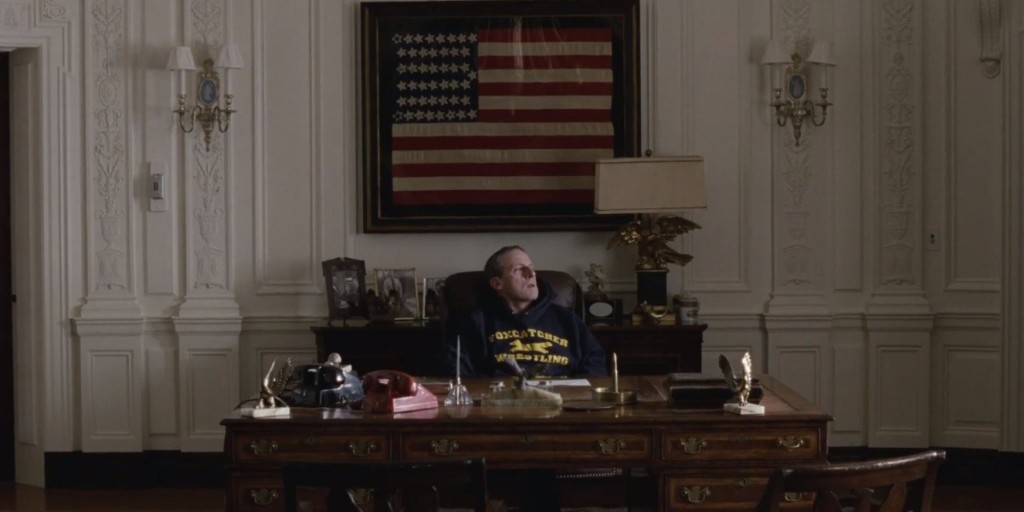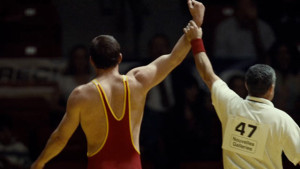 Foxcatcher is a good movie. It is well-mounted, with impeccable cinematography and production design. The acting is superb and is headlined by one of those showy disappearing-act performances that should gobble up attention and awards. The story handles some weighty themes with a deft and incisive touch. But you’re probably not going to see it, and that’s fine. It’s just one of those movies that’s good, but fails to gain any traction outside of cinephile circles.
Foxcatcher is a good movie. It is well-mounted, with impeccable cinematography and production design. The acting is superb and is headlined by one of those showy disappearing-act performances that should gobble up attention and awards. The story handles some weighty themes with a deft and incisive touch. But you’re probably not going to see it, and that’s fine. It’s just one of those movies that’s good, but fails to gain any traction outside of cinephile circles.
The foundation of the film certainly sounds like something that could be a minor hit. An awards-baity teaming of Bennett Miller, who was Oscar-nominated for directing Capote, Megan Ellison, the Silicon Valley scion who has become Hollywood’s most consistent auteur-enabler over the past few years, and three actors–Steve Carell, Channing Tatum, and Mark Ruffalo–going serious after becoming A-listers with lighter fare. The story concerns the unhealthy relationships between John Eleuthère du Pont (Carrell), a socially maladjusted chemical fortune heir, and the pair of wrestling star brothers, Dave and Mark Schultz (Ruffalo and Tatum), who become drawn into his world. The film seems split into two halves, exploring how Mark grapples with his feelings of insufficiency and anger first against the aloof splendor of du Pont and then with the disappointing familiarity of Dave.
High-minded and well-executed…
The execution of that narrative has a lot of strong elements. Thematically, Foxcatcher seems to hone in on the hollow nature of the American dream. Du Pont is American nobility, the kind of 1%-er who assumes he can buy whatever he wants to fill the gaping lack of normal human emotion or interaction in his life. The way he brings first Mark and then Dave Schultz to his estate, the eponymous Foxcatcher Farms, and then instantly dictates their lives from an icy remove is a perfect metaphor for the strained economic divide that Occupy Wall Street made into headlines three years ago.
Miller also does a very good job with showing rather than telling in establishing and exploring these characters. Seeing Mark Schultz lash out in the ring or silently wolfing down fast food in a car tells us more about him than dialogue ever could. Du Pont and Dave are similarly characterized through gestures or surroundings, which gives Miller plenty of space to make oblique suggestions about their emotional states and the aforementioned themes. It’s the kind of thing that Miller has excelled at across all three of his films: giving characters like Truman Capote and Billy Beane the space to define themselves and then ask us what those self-definitions say about American masculinity and identity.
…But lacking that je ne sais quoi.
 Foxcatcher is not as good as those previous films, though. What it seems to lack, in comparison to Miller’s other work and the rest of this year’s films, is a sense of dynamism or propulsion. Miller is very dedicated to his cold aesthetic and careful dramatic remove, which have served him well before, but they fail to add up to a ton. It’s noble and engrossing to let the audience draw their own connections and suss out why character y has done action x, but storytelling like that needs characters we can invest in. Capote and Beane were both magnetic people played by actors at the top of their game. Whether it was Phillip Seymour Hoffman’s alluringly toxic narcissism or Brad Pitt’s uneasy mix of nerves and surety, previous Miller films gave us a character to stick with. Foxcatcher lacks anyone with that dynamism. Mark Schultz is a broding and internalized hulk, and while Tatum does career-best work in playing him, the character’s torment isn’t enough to be a through-line. Dave is a gentle bear of a man, whose trusting nobility keeps him from fully grasping the peril his family is in. And du Pont, whose eccentric descent into madness could have provided that dramatic spark, sinks into the background after an hour.
Foxcatcher is not as good as those previous films, though. What it seems to lack, in comparison to Miller’s other work and the rest of this year’s films, is a sense of dynamism or propulsion. Miller is very dedicated to his cold aesthetic and careful dramatic remove, which have served him well before, but they fail to add up to a ton. It’s noble and engrossing to let the audience draw their own connections and suss out why character y has done action x, but storytelling like that needs characters we can invest in. Capote and Beane were both magnetic people played by actors at the top of their game. Whether it was Phillip Seymour Hoffman’s alluringly toxic narcissism or Brad Pitt’s uneasy mix of nerves and surety, previous Miller films gave us a character to stick with. Foxcatcher lacks anyone with that dynamism. Mark Schultz is a broding and internalized hulk, and while Tatum does career-best work in playing him, the character’s torment isn’t enough to be a through-line. Dave is a gentle bear of a man, whose trusting nobility keeps him from fully grasping the peril his family is in. And du Pont, whose eccentric descent into madness could have provided that dramatic spark, sinks into the background after an hour.
While the eventual emotional catharsis and violent climax are well-done, our arrival there seems more determined by historical and dramatic necessity than the building action of the film’s own narrative. I’ve heard that the original cut of Foxcatcher ran to nearly three hours, which is intriguing. It makes me wonder if compelling material was cut out to make the product a more appealing prospect for audiences and awards voters. If so, that’s a shame. I could also see a cut of this movie that is 30 minutes shorter working very well. Compressing the dramatic action some may have stepped on Miller’s professed style, but it also could have turned the story’s fatal slow-burn into an unbearably tense one.
In either case, Foxcatcher is still a film worth seeing. Miller retains an exceptional eye and captures both the kitsch grandeur of the elites and the depressing fluorescent glare of working class life. The acting is all worthy of awards attention, though only Ruffalo seems assured of an Oscar nod. The film itself is likely to miss out in favor of similar-sized films that have roused more passionate support (i.e. Whiplash or Nightcrawler). Passion is definitely something that Foxcatcher seems to be lacking (outside of social media meltdowns), and that’s probably why you’re not going to see it.
Images via The Huffington Post and Apple.com.





